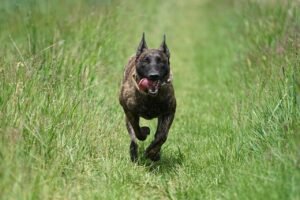If you’ve ever wondered how long your beloved Dutch Shepherd will be by your side, you’re in the right place. In this article, we’ll explore the lifespan of these intelligent and loyal dogs. From their vibrant and energetic youth to their golden years, we’ll uncover the factors that influence their longevity and provide you with valuable insights to ensure a long and happy life for your Dutch Shepherd companion. So, let’s dive right in and discover the average lifespan of this remarkable breed.
Physical Characteristics of a Dutch Shepherd
Size
The Dutch Shepherd is a medium to large-sized dog breed. Males typically stand between 22-24 inches (56-61 cm) at the shoulder, while females are slightly smaller, measuring between 21-23 inches (53-58 cm). They have a well-muscled and athletic build, combining strength and agility.
Coat
The Dutch Shepherd has a short, dense, and harsh coat that serves as a protective layer. The coat allows them to withstand different weather conditions and protects their skin from scratches and injuries. They have a double coat, with a soft and insulating undercoat and a longer, coarser outer coat.
Color
Dutch Shepherds come in three recognized colors: brindle, fawn, and brindle with a black overlay. The brindle coat pattern consists of a base color with darker stripes or patches. Fawn Dutch Shepherds have a solid light brown or tan color. The brindle with a black overlay coat has a brindle pattern with a black mask and ears, giving them a unique appearance.
Health Concerns for Dutch Shepherds
Hip Dysplasia
Hip dysplasia is a common concern in Dutch Shepherds and many other large breeds. It is a hereditary condition where the hip joint doesn’t develop properly, causing discomfort, pain, and eventually, mobility issues. Regular exercise, maintaining a healthy weight, and avoiding excessive jumping can help minimize the risk of hip dysplasia.
Elbow Dysplasia
Similar to hip dysplasia, elbow dysplasia is another orthopedic condition that affects Dutch Shepherds. It occurs when the elbow joint doesn’t form correctly, leading to joint pain, lameness, and decreased mobility. Proper nutrition, controlled exercise, and avoiding rapid growth can help reduce the risk of elbow dysplasia.
Progressive Retinal Atrophy (PRA)
Progressive retinal atrophy is a genetic eye disorder that gradually leads to vision loss and eventual blindness. Although not exclusive to Dutch Shepherds, they are one of the breeds prone to this condition. Regular eye examinations by a veterinary ophthalmologist can help diagnose and manage PRA in Dutch Shepherds.
Epilepsy
Epilepsy is a neurological disorder characterized by recurrent seizures. Dutch Shepherds can be affected by epilepsy, and it is believed to have a genetic basis. Seizures can range in severity, and medication prescribed by a veterinarian can help manage and control this condition.
Factors Affecting the Lifespan of a Dutch Shepherd
Genetics
Genetics play a significant role in determining the lifespan of Dutch Shepherds. Responsible breeders strive to select dogs with a healthy genetic background to improve the overall health and longevity of the breed. By considering the health history of the parents and performing genetic health screenings, breeders can minimize the risk of inherited health issues.
Diet and Nutrition
Proper nutrition is vital to the overall health and lifespan of Dutch Shepherds. A balanced and high-quality diet helps provide essential nutrients, supports a strong immune system, and contributes to healthy organ function. It is important to consult with a veterinarian to determine the appropriate diet and feeding regimen for your Dutch Shepherd based on their age, weight, and any specific health concerns.
Exercise and Activity Level
Regular exercise and physical activity are essential for a Dutch Shepherd’s overall well-being. A lack of exercise can lead to weight gain, muscle loss, and behavioral issues. On the other hand, excessive exercise or high-impact activities at a young age can put strain on their joints and increase the risk of orthopedic issues. Providing a balanced exercise routine that includes both mental stimulation and physical activities suitable for their age and energy level can help promote a longer lifespan.

Veterinary Care
Regular veterinary care is crucial in maintaining the health and longevity of a Dutch Shepherd. Routine check-ups, vaccinations, parasite prevention, and dental care are essential components of their overall healthcare. Early detection and treatment of any health issues can significantly impact their quality of life and lifespan. It is recommended to follow a veterinarian’s guidance regarding preventive care and schedule regular visits to monitor their health.
Average Lifespan of a Dutch Shepherd
The average lifespan of a Dutch Shepherd is typically between 10-14 years. However, various factors such as genetics, lifestyle, and overall health management can influence an individual dog’s lifespan. With proper care, nutrition, and regular veterinary check-ups, Dutch Shepherds may live a long and healthy life.
Ways to Extend the Lifespan of a Dutch Shepherd
Regular Veterinary Check-Ups
Regular veterinary check-ups are paramount to monitor the health of a Dutch Shepherd and address any potential issues promptly. Routine examinations, vaccinations, and preventive screenings can help detect and prevent health problems before they become serious.
Balanced Diet and Nutrition
Feeding a balanced diet appropriate for a Dutch Shepherd’s age and specific needs is essential for their overall health and longevity. Providing high-quality dog food that meets their nutritional requirements, avoiding overfeeding to prevent obesity, and incorporating appropriate supplements can contribute to a longer lifespan.
Exercise and Mental Stimulation
Engaging a Dutch Shepherd in regular exercise and mental stimulation is vital for their physical and mental well-being. Providing daily walks, interactive play sessions, and mentally challenging activities can help prevent boredom, reduce anxiety, and promote a longer and healthier life.
Proper Training and Socialization
Proper training and socialization are essential for a Dutch Shepherd’s mental and emotional development. Early and consistent training helps cultivate good behavior, promotes obedience, and enhances the bond between the dog and their owner. Socialization with other dogs and various environments helps reduce fear and anxiety, leading to a well-adjusted and happy Dutch Shepherd.
Signs of Aging in Dutch Shepherds
Decreased Energy Levels
As Dutch Shepherds age, they may experience decreased energy levels and become less enthusiastic about physical activities or playtime. It is important to adjust their exercise routine and provide them with sufficient rest to accommodate their changing needs.
Joint Stiffness and Arthritis
Joint stiffness and arthritis are common signs of aging in Dutch Shepherds. As they get older, their joints may become stiff, leading to discomfort and mobility issues. Providing joint supplements, ensuring they have comfortable bedding, and avoiding excessive strain on their joints can help alleviate these symptoms.
Dental Issues
Dental issues, such as gum disease, tooth decay, and tooth loss, can occur as Dutch Shepherds age. Regular dental care, including tooth brushing, dental chews, and professional dental cleanings, can help maintain their oral hygiene and prevent dental problems.
Vision and Hearing Loss
Dutch Shepherds may experience vision and hearing loss as they age. It is important to be patient and understanding with them, providing extra guidance and support to help them navigate their surroundings. Regular veterinary check-ups can help monitor their sensory health and address any age-related changes appropriately.
Quality of Life for Aging Dutch Shepherds
Comfortable Living Environment
Creating a comfortable living environment for aging Dutch Shepherds is essential for their well-being. Providing a soft and supportive bed, easy access to water and food, and minimizing physical barriers can help them navigate their surroundings more comfortably.
Adaptation of Exercise Routine
As Dutch Shepherds age, their exercise routine should be adjusted to accommodate their decreasing energy levels and physical abilities. Gentle and low-impact activities such as short walks or swimming can still provide mental stimulation and keep them active without putting excessive strain on their joints.
Specialized Senior Dog Food
Switching to a specialized senior dog food formulated for the nutritional needs of older dogs can support their overall health. These foods often contain ingredients to promote joint health, support a healthy immune system, and maintain an appropriate weight.
Regular Veterinary Monitoring
Regular veterinary monitoring is crucial for aging Dutch Shepherds to ensure any age-related changes or health issues are addressed promptly. Regular check-ups, blood work, and diagnostic tests can help detect and manage any health conditions that may arise.
Common Causes of Death in Dutch Shepherds
Age-Related Illnesses
As Dutch Shepherds age, they become more susceptible to age-related illnesses such as organ failure, heart disease, and degenerative conditions. Regular veterinary care and monitoring can help manage these conditions and provide them with the best care possible.
Cancer
Cancer is a leading cause of death in Dutch Shepherds, as it is in many dog breeds. Regular screenings, early detection, and appropriate treatment options can help improve their prognosis and quality of life.
Accidents or Trauma
Accidents or trauma, such as car accidents or falls, can sadly result in the premature death of Dutch Shepherds. Maintaining a safe environment, providing proper supervision, and taking precautions during activities such as hiking or swimming can help reduce the risk of accidents.
Inherited Health Conditions
Inherited health conditions, such as hip or elbow dysplasia, may progress to a point where the dog’s quality of life is severely impacted, and euthanasia may be the most humane choice. Responsible breeding practices and genetic health screenings can help reduce the prevalence of these inherited conditions and minimize the risk of suffering or premature death.
Comparative Lifespan of Dutch Shepherds with Other Breeds
The average lifespan of a Dutch Shepherd is comparable to that of other similar-sized working breeds. However, it is important to note that lifespan can vary significantly among individuals, and various factors such as genetics, lifestyle, and healthcare play a role in determining an individual dog’s lifespan.
Conclusion
The Dutch Shepherd is a versatile and intelligent breed known for its athleticism and loyalty. Like any breed, they have their own set of genetic predispositions and potential health concerns. By providing them with proper care, nutrition, exercise, and regular veterinary check-ups, you can help ensure a long and fulfilling life for your Dutch Shepherd. Remember, love, companionship, and quality healthcare are key to ensuring the well-being of this amazing breed.

